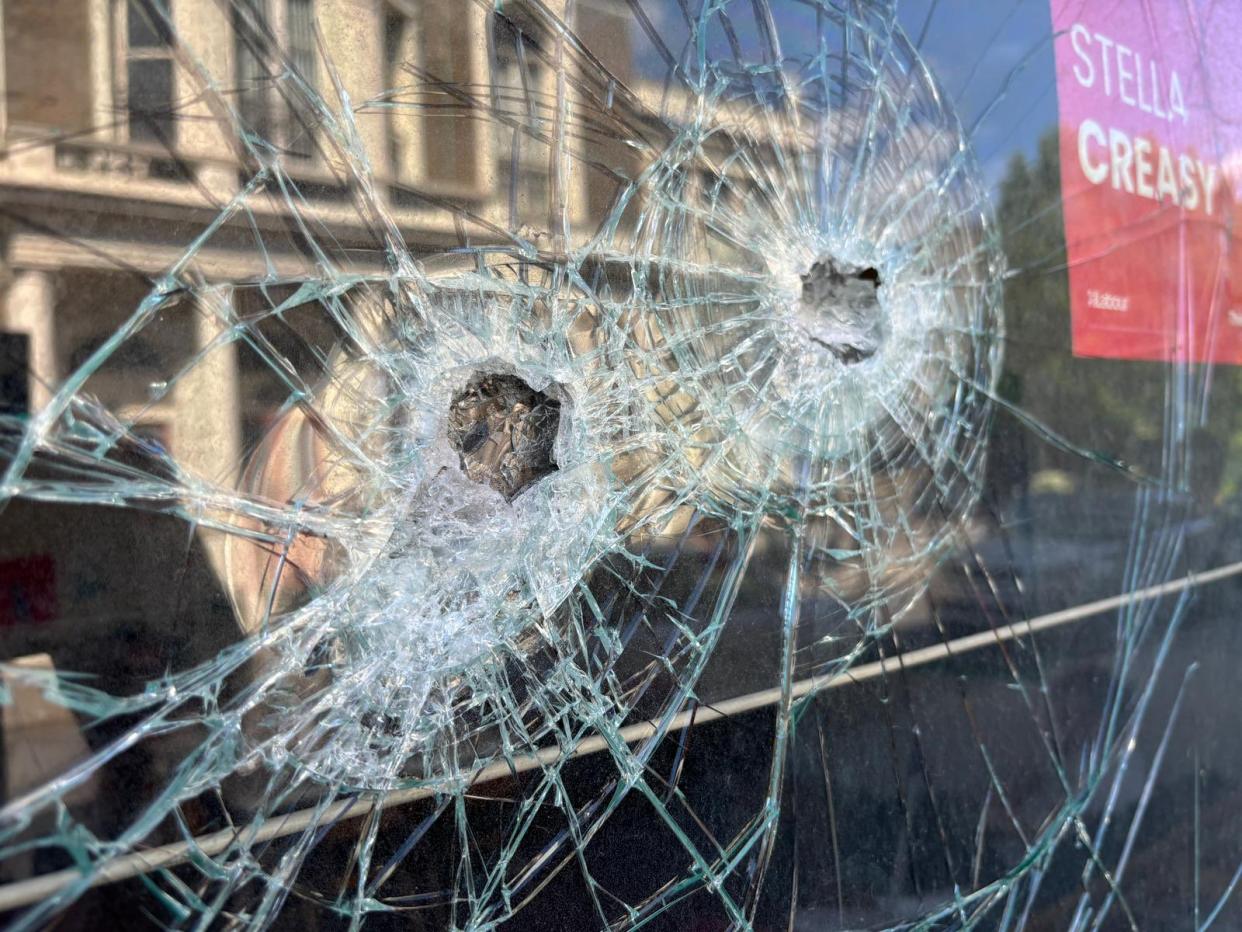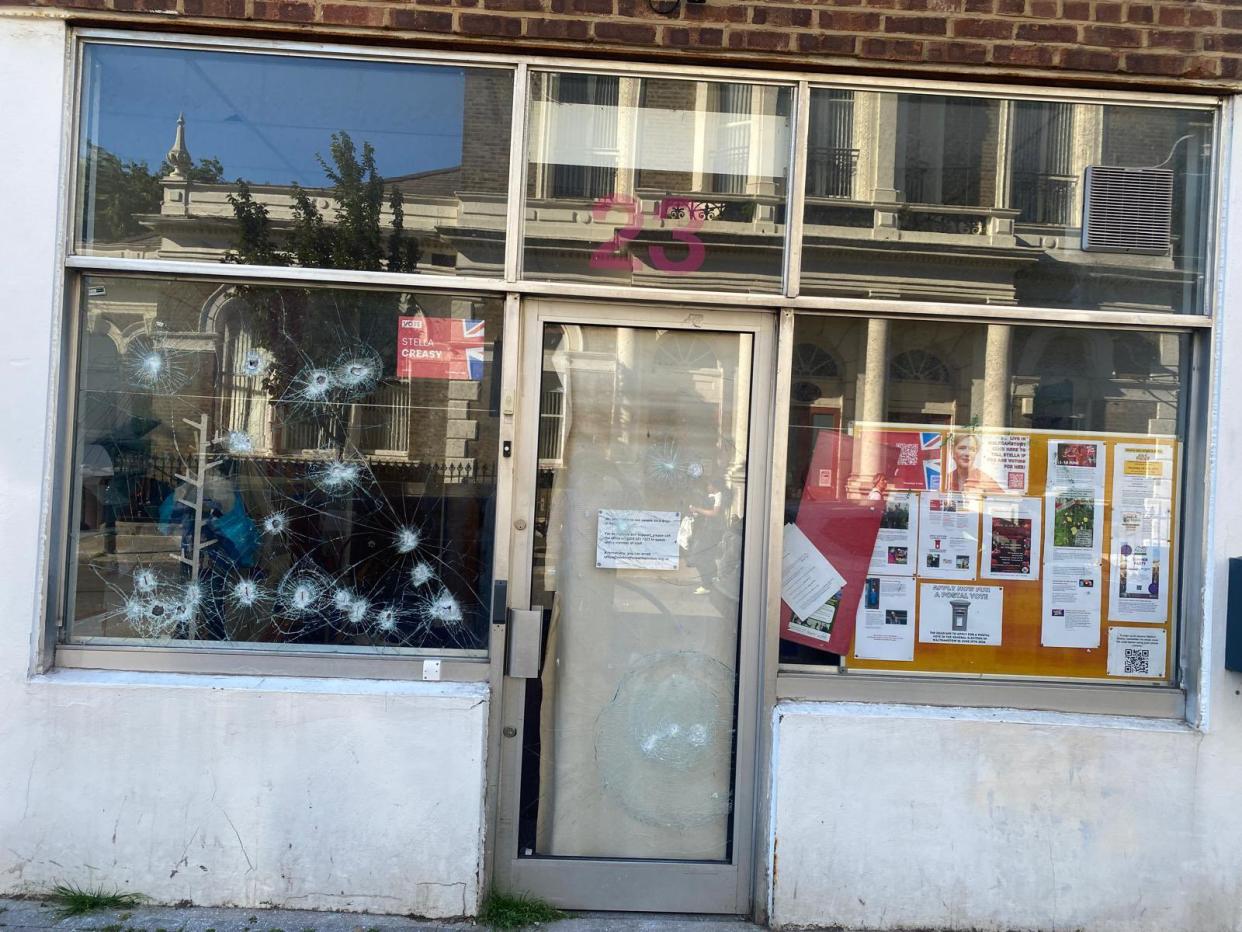'You don’t intimidate me': Labour election candidate defiant after office attacked overnight

Labour's Stella Creasy has condemned an "anti-democratic attack" on her constituency office in east London after the front windows were left damaged.
Whoever attacked the general election candidate's office in Walthamstow failed to shatter the entire window but left several cracks and holes in the early hours of Sunday morning.
This isn't the first time Creasy has been the victim of intimidating behaviour, having previously received death and rape threats, and malicious accusations by a man later convicted of harassment.
While the exact motive for Saturday's attack is unclear, Creasy appeared defiant as she shared the news on X.
"Message to whoever attacked my office last night. You don’t intimidate me and you don’t belong in the political process," she wrote.
"Same as those circulating malicious and false leaflets. Police already on this to find you - will press for the strongest penalties for such an anti-democratic attack and I know Walthamstow won’t be cowed or influenced by your violence either."
Read more:
Racist taunts, rape threats and murder: Joe Penhall on his play about violence against MPs (The Guardian)
‘We have entered an era of extreme protest’: The dangers facing MPs on the campaign trail (The Telegraph)
Terror attack survivors urge politicians to make clear pledges for victims (The Independent)
A Metropolitan Police spokesperson confirmed to Yahoo News that an investigation has been launched into criminal damage.
Detective Superintendent Dion Brown said: “It is entirely unacceptable for the office of one of London’s prospective parliamentary candidates to be targeted in this way.
"An urgent investigation is under way, and officers have attended the scene and are already following up active lines of enquiry, which will include full analysis of all available CCTV footage.
“The incident is believed to have occurred between 03:10hrs and 03:30hrs on Sunday, 23 June. I urge any witnesses or anyone with information to contact police and share what they know.”

Anyone who witnessed the damage being caused, or who has other information, should call police on 101 with the reference 2621/23jun.
Labour candidate for Chingford and Woodford Green Shama Tatler tweeted: "This is absolutely horrible & has no place in a democracy. Over the election campaign, we have seen the very best of Britain- a vibrant, pluralist democracy.
"But attacks like this showcase the very worst. My thoughts are with @stellacreasy, her staff & the whole community."
Former UKIP leader and media commentator Henry Bolton added: "I don’t care how much you disagree with or dislike a politician, behaviour of this sort is gutter behaviour and criminal.
Message to whoever attacked my office last night. You don’t intimidate me and you don’t belong in the political process. Same as those circulating malicious and false leaflets. Police already on this to find you - will press for the strongest penalties for such an anti 1/2 pic.twitter.com/QfLjcohbzA
— stellacreasy (@stellacreasy) June 23, 2024
"The offenders are vile creatures who clearly object to freedom of opinion and speech, and are anti-democratic. I hope the book is thrown at them."
The attack on Creasy's office came just after the 50th birthday of Labour MP Jo Cox, who was murdered by a far-right extremist in June 2016 outside her constituency office in Birstall, near Leeds.
Writing on X on Saturday, her husband Brendan Cox, who has become a prominent anti-extremism campaigner, said: "Her murder is a reminder of where hate filled politics can lead. Her life was testament to the positive potential of politics."
Jo would have been 50 today. We have missed her everyday since she died.
Her murder is a reminder of where hate filled politics can lead. Her life was testament to the positive potential of politics.
Today we are taking the kids (indoor) skydiving to celebrate her in style. pic.twitter.com/B39GCiynUd— Brendan Cox (@MrBrendanCox) June 22, 2024
Creasy is not the only Parliamentary candidate to face such threatening behaviour in the run up to the July 4 general election.
On June 4, Reform UK leader Nigel Farage had a milkshake thrown in his face while campaigning in Clacton, Essex. Exactly a week later, the populist politician had objects thrown at him from a construction site in Barnsley, South Yorkshire, while riding on an open top deck of a campaign bus.
While Farage was unharmed, he told ITV News after the first incident that being pelted in the face by a stranger with an unknown liquid was nonetheless "quite frightening".
What security do MPs receive and how much does it cost?
MPs from across the political spectrum have reported serious threats to their security, with the volume of such cases increasing over the past decade, according to the Institute for Government think tank.
Data published by the Metropolitan Police showed the number of alleged crimes against MPs in London had risen from 151 in 2017 to 342 in 2018 – an increase of 126%, while a BBC survey in 2019 found that over 60% of MPs who responded had reported threats to police in the previous year.
All MPs are advised to take routine security measures, while others may receive "enhanced" or "further" security measures in response to individual circumstances, particularly if police have recommended them.
Until April 2023, both forms of measures were funded by the Independent Parliamentary Standards Authority (IPSA), which sets and regulates the payment of MPs’ pay, pensions and business costs.
However, since April 2023, routine security measures are funded via accommodation and office cost expenses that MPs can claim from IPSA, while the House of Commons itself pays for further security measures.
As for how much it costs, the best available data we have is from before the changes to the rules in April 2023, based on IPSA's security assistance budget.
It says that in 2022/23, total spending was £3.3m, which was slightly lower than the £4.4m paid in 2020/21 and 2021/22, but was still 80 times higher than the amount spent in 2010/11.
In early 2016, following threats made to MPs over Parliamentary debates on military action in Syria, the National Police Chiefs’ Council (NPCC) recommended that all MPs adopt a package of security measures.
Concerns continued to rise from then, with the murder of Jo Cox in June 2016, followed by a terror attack outside the Houses of Parliament in March 2017, with funding rising significantly since then.
In February 2024 the government announced a £31m package aimed at boosting MPs' security, with prime minister Rishi Sunak claiming there is a "growing consensus that mob rule is replacing democratic rule".
The government has said that this money will be used to ensure that all elected representatives and election candidates will have a named contact in the police with whom to discuss security matters.
It says the funding package will be used to enhance police capabilities, boost private sector security provisions for those facing a higher risk and to increase cyber security advice to locally elected representatives.
Your guide to voting
The leaders
Who is Rishi Sunak? The PM battling to stay in power after election gamble
Who is Keir Starmer? The toolmaker's son promising change for the UK
Who is Ed Davey? Lib Dem leader attracting attention with election stunts
Who is Richard Tice? Reform’s former leader turned Farage sidekick



